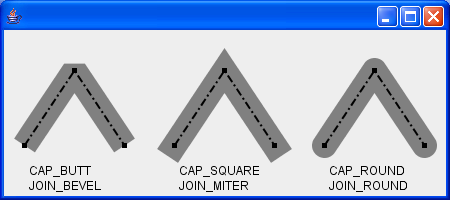Line Styles

/*
* Copyright (c) 2000 David Flanagan. All rights reserved.
* This code is from the book Java Examples in a Nutshell, 2nd Edition.
* It is provided AS-IS, WITHOUT ANY WARRANTY either expressed or implied.
* You may study, use, and modify it for any non-commercial purpose.
* You may distribute it non-commercially as long as you retain this notice.
* For a commercial use license, or to purchase the book (recommended),
* visit http://www.davidflanagan.com/javaexamples2.
*/
import java.awt.BasicStroke;
import java.awt.Color;
import java.awt.Font;
import java.awt.Graphics;
import java.awt.Graphics2D;
import java.awt.RenderingHints;
import java.awt.Stroke;
import java.awt.event.WindowAdapter;
import java.awt.event.WindowEvent;
import java.awt.geom.GeneralPath;
import javax.swing.JFrame;
import javax.swing.JPanel;
/** A demonstration of Java2D line styles */
public class LineStyles extends JPanel{
public String getName() {
return "LineStyles";
}
public int getWidth() {
return 450;
}
public int getHeight() {
return 180;
}
int[] xpoints = new int[] { 0, 50, 100 }; // X coordinates of our shape
int[] ypoints = new int[] { 75, 0, 75 }; // Y coordinates of our shape
// Here are three different line styles we will demonstrate
// They are thick lines with different cap and join styles
Stroke[] linestyles = new Stroke[] {
new BasicStroke(25.0f, BasicStroke.CAP_BUTT, BasicStroke.JOIN_BEVEL),
new BasicStroke(25.0f, BasicStroke.CAP_SQUARE,
BasicStroke.JOIN_MITER),
new BasicStroke(25.0f, BasicStroke.CAP_ROUND,
BasicStroke.JOIN_ROUND), };
// Another line style: a 2 pixel-wide dot-dashed line
Stroke thindashed = new BasicStroke(2.0f, // line width
/* cap style */BasicStroke.CAP_BUTT,
/* join style, miter limit */BasicStroke.JOIN_BEVEL, 1.0f,
/* the dash pattern */new float[] { 8.0f, 3.0f, 2.0f, 3.0f },
/* the dash phase */0.0f); /* on 8, off 3, on 2, off 3 */
// Labels to appear in the diagram, and the font to use to display them.
Font font = new Font("Helvetica", Font.BOLD, 12);
String[] capNames = new String[] { "CAP_BUTT", "CAP_SQUARE", "CAP_ROUND" };
String[] joinNames = new String[] { "JOIN_BEVEL", "JOIN_MITER",
"JOIN_ROUND" };
/** This method draws the example figure */
public void paint(Graphics g1) {
Graphics2D g = (Graphics2D) g1;
// Use anti-aliasing to avoid "jaggies" in the lines
g.setRenderingHint(RenderingHints.KEY_ANTIALIASING,
RenderingHints.VALUE_ANTIALIAS_ON);
// Define the shape to draw
GeneralPath shape = new GeneralPath();
shape.moveTo(xpoints[0], ypoints[0]); // start at point 0
shape.lineTo(xpoints[1], ypoints[1]); // draw a line to point 1
shape.lineTo(xpoints[2], ypoints[2]); // and then on to point 2
// Move the origin to the right and down, creating a margin
g.translate(20, 40);
// Now loop, drawing our shape with the three different line styles
for (int i = 0; i < linestyles.length; i++) {
g.setColor(Color.gray); // Draw a gray line
g.setStroke(linestyles[i]); // Select the line style to use
g.draw(shape); // Draw the shape
g.setColor(Color.black); // Now use black
g.setStroke(thindashed); // And the thin dashed line
g.draw(shape); // And draw the shape again.
// Highlight the location of the vertexes of the shape
// This accentuates the cap and join styles we're demonstrating
for (int j = 0; j < xpoints.length; j++)
g.fillRect(xpoints[j] - 2, ypoints[j] - 2, 5, 5);
g.drawString(capNames[i], 5, 105); // Label the cap style
g.drawString(joinNames[i], 5, 120); // Label the join style
g.translate(150, 0); // Move over to the right before looping again
}
}
public static void main(String[] a){
JFrame f = new JFrame();
f.addWindowListener(new WindowAdapter() {
public void windowClosing(WindowEvent e) {
System.exit(0);
}
});
f.setContentPane(new LineStyles());
f.setSize(450,200);
f.setVisible(true);
}
}
Related examples in the same category